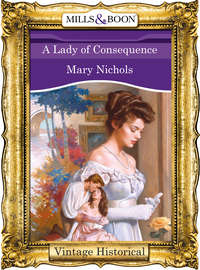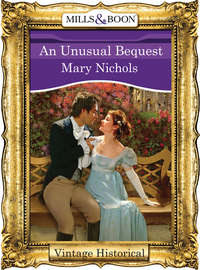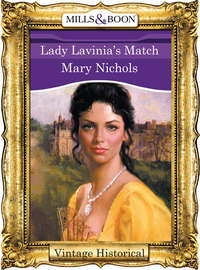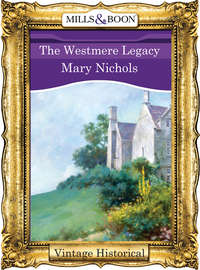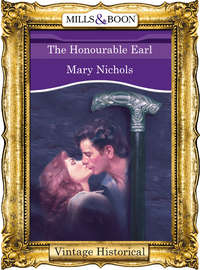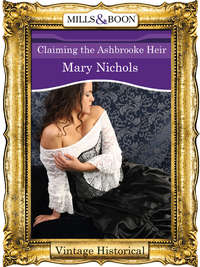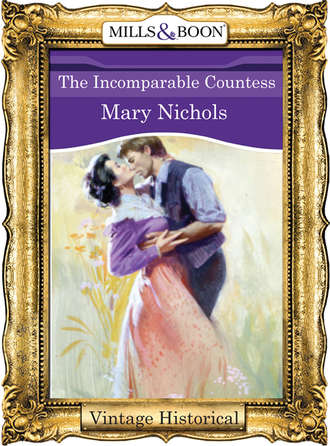
Полная версия
The Incomparable Countess
He laughed. ‘And you so poor you cannot afford to turn him down!’
‘No, I can’t. I put the money I earn to very good use.’
‘Now, I never had you down as a pinchcommons.’ He sighed. ‘It just shows how wrong a fellow can be.’
She laughed. ‘You know me better than anyone, Percy, and you know I am not at all interested in money for its own sake.’
‘Do I?’
‘Naturally, you do.’
‘But you know the latest on dit is that his Grace is looking for a second wife.’
‘So?’
‘Will he go back unmarried, I ask myself?’
‘What has that to do with me?’
‘He is rich as Golden Ball, if it is money you want. Not that you would have much of a bargain. The gabble-grinders have it that his marriage was far from content and the consensus of opinion seems to be that it was his fault. He is too stiff and overweening to make any woman happy and only his enormous wealth will make the ladies overlook his failings.’
‘Percy, I do believe you are a little jealous.’
‘Not at all.’ They passed through the gate into Park Lane. ‘But do not say I did not warn you.’
They rode on in silence while she mused on what he had said and arrived at Corringham House, just as the phaeton containing the Duke and his daughter turned into the road. This was beginning to become a habit, she thought, this meeting on the doorstep. She must remember that the Duke was a stickler for punctuality and not to be late in future. They stopped and Sir Percival sprang down to help her dismount as the carriage containing the Duke and his daughter came to a halt.
She was magnificent, Marcus decided, standing at her door in a green velvet habit that nipped her waist, and the most amazing riding hat, like a man’s top hat, but with a sweeping feather and a wisp of veil to make it more feminine. He jumped down and made his bow. ‘My lady.’
She inclined her head, almost haughty, except that her smile belied it. ‘Your Grace, am I late or are you early?’
‘I am punctual, my lady. It is the politeness of kings, so they say, and who am I to be less polite than a king?’
‘I will remember that, my lord. Will you please come in? Sir Percival, will you join us?’
‘No, don’t think so, m’dear,’ he murmured, taking her hand and kissing the back of it. ‘Things to do, don’t you know?’
‘Of course. Thank you for your escort.’
‘My pleasure, dear lady.’ He turned to the Duke. ‘Good day, Loscoe. Lady Lavinia.’ And with that he remounted and set off at a trot towards Brook Street.
‘I do not intend to stay long,’ Marcus said to the groom who came round from the side of the house to lead the horses away. ‘Just keep a watch on the horses for me.’
Relieved by that, Frances conducted them indoors and, once his Grace had been relieved of his hat and Lady Lavinia had been divested of her pelisse and bonnet, led the way up to her studio, where she left them to go and change out of her habit.
It took her no more than five minutes and she returned to find Lavinia standing at the window with her back to the room and the Duke prowling round looking at the pictures displayed on the wall. He had his hands clasped under the tail of his brown frockcoat.
‘These are good,’ he said. ‘A deal better than that fribble you did of Lady Willoughby.’
‘Thank you. They are the ones I have painted for my own pleasure.’
‘You should share that pleasure, not hide them away.’
‘They are not hidden,’ she said, thinking of those she had painted of him seventeen years before and was glad she had put them on the floor with their faces to the wall. She did not want him to know that she had kept them. ‘Anyone who comes into this room can see them.’
‘But you have not exhibited them?’
‘No, they are not fashionable.’
‘I can readily see that. There is too much stark realism, the brushstrokes are too bold but, in my humble opinion, the execution is top of the trees. I am sure a more discerning public would see their merit at once.’
She laughed. ‘You think someone would like to hang a picture of a dead fox on their drawing-room wall?’
‘No, perhaps not that one. Why did you do it?’
‘The barbarity appalled me.’
Lady Lavinia turned towards her. ‘You think so too, my lady? I hate it. Papa persuaded me to join in the hunt last autumn and, though I enjoyed the ride, it was awful when the dogs caught the fox. They cut off its brush and wiped my face with it. I was dreadfully sick. I’ll never go again.’ It was the longest speech Frances had heard her make.
‘I told you, Vinny,’ the Duke put in with a smile, ‘you only have to be blooded once. It will not happen again.’
‘I am sure that is a great comfort to the fox,’ she retorted. ‘It only has to die once. Well, I tell you this: when I marry, I shall not let my husband hunt.’
He grinned. ‘You think you will have the ordering of your husband, do you? Oh, Vinny, you have a great deal to learn if you believe that.’
‘I shall have it written in the marriage contract or there will be no marriage.’
He laughed aloud, which made the girl colour angrily and Frances decided to intervene. ‘You are evidently very fond of animals, Lady Lavinia.’
‘Yes. I have a menagerie at home at Loscoe Court, but of course I could not bring them with me. Tom, the stable boy, is looking after them for me.’
‘Have you tried to draw them?’
‘No. Why should I? They are there to be seen and touched—why would I want to commit them to paper?’
‘Now, there is an interesting question.’
‘What is?’
‘Why commit anything to paper or canvas? Or plaster and bronze, come to that? Shall we sit down and discuss it? We could do that while I make some preliminary sketches of you.’
‘I would rather be out of doors.’
‘Then let us go into the garden.’ She rose and collected up two sketchbooks and a few pieces of charcoal. Then she turned to Marcus. ‘You may safely leave Lady Lavinia with me, my lord. I am sure you have other calls on your time.’ It was as near a dismissal as she could make without being unpardonably rude. She wanted him to leave; his presence, even when he was not speaking, was unnerving. She needed to be calm and in control, if she were going to teach her pupil anything at all.
He rose and smiled. ‘I will return for her in an hour.’
They went down to the front hall together, where he retrieved his hat, bade Lavinia behave herself, and took his leave.
‘Well, he did not need to say that,’ Lavinia said, peevishly. ‘I am not a child. Anyone would think I was going to demolish the place.’
‘Oh, I do hope not,’ Frances said with a laugh. ‘I have only just got it looking the way I want it.’
Lavinia looked sideways at her and then, realising she was joking, smiled. Her smile, like her father’s, lit her eyes, making Frances wonder why she did not do so more often. There was the promise of great beauty and a telling charm, which should be nurtured. Was that what Marcus had meant about polish? And should she still be thinking of him as Marcus, when that intimacy had long ago vanished and she ought always refer to him, even in her thoughts, as ‘his Grace’ or ‘the Duke’?
‘Come along,’ she said briskly, leading the way through the main hall, past the carved oak staircase and along a corridor to a door which led into a conservatory filled with exotic plants. It was hot and humid and smelled of peat and the heavy perfume of tropical flowers. They passed quickly through it and out into the garden, where the air was dry and balmy. ‘Now, where shall we sit, in the arbour or by the pool?’
Lavinia shrugged. ‘It’s all one to me. I would sooner be sitting a horse.’
Frances laughed. ‘Do you know, so would I.’
‘Then why do this?’ Her arm indicated the drawing equipment.
‘Because we cannot always be doing what we want to do. We all, even you, have obligations, commissions, tasks, whatever you like to call them, which must be seen to before we can think of pleasure. Your papa is paying me to teach you to draw and so I must put my efforts into that. Now, let us make a start.’ She looked about her and pointed to a small wooden structure at the end of the path, which had fretted sides and a steep pitched roof with a cupola on the top. ‘Would you like to draw the pergola?’
‘Oh, very well.’ Lavinia gave a great sigh and took the sketch-book and charcoal Frances held out to her and sat down on a bench beside the pool. She slashed impatiently at the paper, making a line here and another there, a few bold curves and some squiggles and the pergola appeared. Without taking the least trouble over it, she had the line and perspective almost exactly right. ‘There,’ she said handing it back. ‘There is your pergola, my lady.’
Frances bit back the scolding she felt bound to deliver. Lavinia was a spoiled child who thought that being uncooperative might relieve her of doing something she did not want to do. ‘Did you suppose this would persuade me that you are a hopeless case, Lavinia, and that I would tell your father we would not go on with the lessons?’
Lavinia sighed heavily. ‘No, for he is paying you.’
‘That is true, but it is not the only reason we will go on, I assure you,’ she said, trying to sound cheerful and friendly, though she was very tempted to give the child a sharp slap. ‘I am afraid I must disagree with your governess—you are not a hopeless case at all, not when it comes to drawing, at any rate.’
‘How can you tell from that? It is nothing but scribble.’
‘Then pray do something that is not scribble. Add some refinements while I begin my sketch of you.’
Lavinia worked with an ill grace, her face set in a scowl, which Frances transferred to her own sketchbook. Then she turned the page and began on a clean sheet. ‘Lady Lavinia, do you think you could smile, or at least have some pleasant thoughts?’
‘Such as?’
‘Imagine you are out riding, or playing with your pet rabbit.’
‘How do you know I have a rabbit?’
‘Oh, no menagerie would be complete without a rabbit.’
Lavinia laughed and Frances began capturing the image, but she had to work quickly before the girl began to frown again. Both worked in silence for perhaps five minutes before Lavinia flung the pad on the seat beside her and began to roam about the garden. Frances continued to work. ‘I cannot capture your likeness if you do not sit still, Lavinia.’
‘Why not? It seems to me likeness has nothing to do with it. Paint what you think my father would like to see, someone demure and pretty, with hands neatly folded and empty eyes. That is what you do, is it not? Whoever pays the piper calls the tune and so you play it.’
Frances was taken aback, not only by the girl’s outspokenness but by her accuracy, and it made her feel uncomfortable. She was even more discomfited when she realised that Marcus had come into the garden and was leaning against a tree watching them. How long he had been there, she did not know. She shut the sketchbook with a snap and stood up. ‘I think we have had enough for one day, Lavinia,’ she said evenly. ‘Your papa is here to fetch you.’
‘Oh, do not stop on my account,’ he said, coming forward. ‘I can sit and watch you both at work.’
‘We have been getting to know one another,’ Frances said. ‘There has been little work done.’
He picked up Lavinia’s book and flipped it open. ‘I can see that,’ he said. ‘A child of six could have done this in three minutes.’
Frances smiled. ‘A child of sixteen did it in one.’
‘Lavinia…’ he began.
‘Oh, I know what you are going to say,’ the girl said. ‘You are going to tell me that is not what you are paying Lady Corringham for.’
Frances took the book from him. ‘Your Grace, we have both learned a great deal this afternoon, though it might not be obvious. Your daughter has a natural talent, which we must encourage. Scolding her for doing what I asked her to do will not make her any more willing.’
‘You asked her to do this scrawl?’
‘I asked her to draw the pergola. And she did. Her imagination added the rabbit, but as she has pointed out to me, I sometimes use my imagination to enhance an image…’
He gave a wry smile. ‘I heard her. It was insufferably impertinent of her and I apologise on her behalf.’
‘Oh, do not do that, sir. If any apologising needs to be done, Lady Lavinia will acknowledge it and do it herself. And perhaps I should crave her pardon for being too condescending.’
‘Fustian! If you are going to collude with her in her mischief, she will only become worse.’
‘Let me be the judge of that, my lord. Now, if you do not wish me to continue giving lessons to your daughter, then please say so. I shall not be offended.’
‘Of course I wish you to continue.’
‘Then she shall come again next Thursday, if that is convenient to you.’
‘It is perfectly convenient.’
She stood up and collected together the drawing equipment. He reached out to take it from her and between them they dropped the sketchbooks. They both stooped at the same moment to pick them up. Their hands touched and she felt a shaft of something akin to fire flash from his fingertips to hers and course along her arm and through her whole frame. She lifted her head and found herself looking into his eyes. His expression puzzled her. It was as if he were trying to convey something to her. Was it reproof? Sympathy? Desire, even? She held his gaze, unable to look away, almost mesmerised by those deep golden eyes.
It lasted only seconds, which seemed like a lifetime before he stood up and held out a hand to bring her to her feet. ‘My lady.’ His voice was perfectly normal.
She murmured ‘Thank you, your Grace,’ and led the way indoors.
Five minutes later, he and his daughter were gone, leaving her breathless. Never, never could she have foreseen the effect he would have on her. Had he noticed it? Had it given him a feeling of satisfaction, that, after seventeen years, he could still put her in a spin?
How was she going to deal with seeing him every time he brought his daughter to her? And if he really was looking for a second wife, he would undoubtedly be out and about, attending functions which she was also expected to attend. She could not shut herself away, her friends would wonder what was wrong with her. And why should she? It behoved her to bring all her self-control to bear and behave with indifference. She would be indifferent.
Chapter Three
Frances was called upon to exercise her indifference sooner than she expected. The Duke of Loscoe was invited to the ball which she had helped to organise in aid of the orphanage. She and a committee of ladies had been planning it for some time and it was to be as grand an affair as they could manage to which all the ton had been invited. He had already made a generous donation to the cause of the orphans and it would have been unthinkable to exclude him.
The choice of venue had been the subject of great debate; should it be held in Almack’s Assembly Rooms, at an hotel, or in a private house? The Assembly Rooms were considered stultifying and there was hardly a hotel with large enough rooms, and besides, their owners would not wish to turn away their ordinary customers to make room for them. If it was to be a private house, then it must have a ballroom big enough to accommodate all the guests they hoped would pay for the privilege of attending.
‘It had better be Corringham House,’ Frances had said.
‘But, Lady Corringham, are you sure?’ Mrs Butterworth had asked. ‘There might be people wishing to come who might not be quite top of the trees. You never know how they might conduct themselves.’
‘If they are prepared to pay, then I am sure we can handle any problems of behaviour. After all, beggars cannot be choosers.’
‘My lady!’ Lady Graham, another member of the committee, cried in horror. ‘We are not beggars. Never let it be said that we are begging.’
Frances had smiled. ‘No, but we are going to ask an exorbitant amount for a ticket, are we not? They deserve Corringham House for that.’
It was some time since Frances had entertained on such a lavish scale; usually she gave small intimate suppers at which conversation, listening to music and playing a few hands of whist were the main ways of passing time. There had not been a ball at the house since Augusta’s come-out five years before and the ballroom had not been used since. She thought she would enjoy the challenge.
And so, on a warm Saturday evening in May, when London was just beginning to fill up for the Season, Corringham House was ablaze with light. Extra servants had been busy all day, polishing the ballroom floor; others were scurrying about carrying chairs, tables, plates and glasses to wherever they were needed. The dining room had been laid out with one long table covered with a pristine damask cloth, ready for the food to be set upon it, and dozens of smaller tables were arranged round the room for the guests to eat supper in small intimate groups. In the over-heated kitchen an army of specially contracted caterers were frantically preparing food, getting in each other’s way and cursing volubly. By early evening, banks of fresh flowers were in place and the musicians had arrived.
Frances made one last tour of the rooms, including one on the first floor for those who did not care to dance and preferred cards, and two others set aside for gentlemen and ladies to leave their hats and cloaks and refresh themselves. There was an attendant in each. Satisfied that all was in readiness, she went up to her bedroom on the second floor, where Rose was waiting to help her dress. She felt hot and sticky and glad to soak in the bath which had been put on the floor of her dressing room and filled with warm, perfumed water.
Until then she had been too busy to reflect on the possible success or otherwise of the enterprise. What would her aristocratic friends think of being asked to pay for the privilege of being her guests? And would they come, knowing that others, just as rich but less socially acceptable, might also pay and they would be obliged to mix with them? It was too late to worry about that now. She stood up and stepped out of the bath. Rose wrapped a towel round her and began rubbing her dry.
When the first carriage rolled up the drive and deposited its occupants on the doorstep, she was ready to greet them. She had chosen to wear an open gown in amber crepe over a silk slip in pale lemon. It had a scooped neckline and puffed sleeves. The amber crepe and the sleeves were sewn with tiny seed pearls and the bodice was caught under the bosom with tiny yellow flowers, the eye of each one studded with a pearl. Her hair was arranged à la Grecque and studded with more pearls. Apart from her rings, she wore no other jewellery.
After the ladies of the committee, who had all arrived promptly, the first guests to arrive were Augusta and her husband, Sir Richard Harnham. Frances, always pleased to see her stepdaughter, kissed her fondly. ‘I am so glad you are here. I have been thinking it will be a very poor do and no one will come.’
‘Fustian!’ Richard said, smiling at her and raising her hand to his lips. ‘Nothing you do is a poor do. It will be a great squeeze, you see if I am not right.’
‘I do hope so.’ She smiled suddenly. ‘Even if no one comes, they have already paid for their tickets. We have banked the money and plans have already been made to spend it.’
‘Oh, Mama, please stop worrying,’ Augusta said. ‘Enjoy yourself.’
Considering there was only twelve years between them, Frances found it amusing that Augusta, now that she was grown up and married and had children of her own, still insisted on calling her Mama, but it did not displease her; she was very fond of Augusta.
Her stepson, James, was the next to arrive, dressed in a black evening coat, skintight pantaloons and shirt points high enough to scratch his cheeks. His muslin cravat had been tied to an intricacy that would have done credit to Beau Brummell. He had a young lady on his arm whom Frances had never seen before, but whom she immediately knew to be a very expensive chère amie indeed. She was dressed in a cream satin high-waisted gown embroidered all over with gold and silver thread. Her hair had obviously been dressed by someone skilled in the art and she wore a diamond necklace, diamond ear drops and several gold bracelets.
‘May I present Miss Annabelle Franks, ma’am,’ James said, drawing her forward.
‘My lady,’ she said, dropping into a curtsy. ‘I am very pleased to meet you.’
‘You are welcome, Miss Franks.’ Then, to her stepson, ‘James, Augusta is arrived, do go and speak to her.’
She watched them go with some trepidation. James had succeeded to his father’s title at the age of seventeen and now, at twenty-four, was something of a scapegrace. Frances had had many a run-in with him over the coils he landed himself in, but for all that she loved him dearly. When not living at the Corringham estate in Essex, he stayed in bachelor chambers in Albany, rather than at Corringham House. She suspected it was because he did not want her to know everything he was up to.
He and the young lady had hardly passed into the ballroom when Sir Percival arrived. He looked like a peacock in his green velvet knee breeches, silk stockings and mauve satin coat. There was a froth of lace at his throat and more spilling over his wrists. He took her hand and bent to kiss it, smiling at her. ‘Fanny, you look beautiful tonight.’
She laughed. ‘Well, thank you, Percy. And I must say, you look magnificent.’
He preened himself in his old-fashioned clothes, unaware of the slight irony in her tone. ‘I shall expect at least one dance.’
‘You may have it, if I have time to dance at all. I might be too occupied.’
‘Gammon! You must make time. I did not pay a ransom for a ticket to be deprived of the pleasure of dancing with you, which was the only reason I came.’
‘Not to help the orphans?’ she teased.
‘I could have made a donation without coming.’
‘I hope not too many of our guests share your sentiments or we shall have an empty ballroom.’
‘No, for half London is agog to see the inside of a house they know only by repute, and observe the haut monde at play. They will come.’
And they did. Almost everyone who had purchased a ticket arrived in their finery and some even came without tickets, prepared to pay at the door. Richard had forecast a squeeze and he was certainly right. By nine o’clock the ballroom was crowded and noisy with music, talk and laughter, even if the different social echelons did remain in little groups, each observing the other. Frances decided that no one else should be admitted and left her post to join the throng and encourage everyone to mingle. She was immediately besieged by well-wishers and it was some time before she was free to dance herself; Percy came to claim her.
‘I told you so, did I not?’ he said as they took the first steps of a cotillion. ‘You cannot say this is not a huge success and the Season hardly begun.’
‘Yes, it was a good decision to have it early, before everyone was engaged in their own round of social events. There are to be several balls in the next three months and no doubt everyone will be exhausted.’
‘Then will you please stop worrying and enjoy this dance, you are as stiff as a ramrod.’
‘I’m sorry.’ She smiled and allowed the music to take over and it wasn’t until the end of the dance, when Percy raised her from a deep curtsy, that she saw the Duke of Loscoe, standing in the open doorway, surveying the crowd. Her earnest hope that he would be otherwise engaged on the night had gone unanswered.
He was immaculately clad in black. His superfine coat looked as though he had been poured into it, so closely did it fit his broad shoulders and narrow waist. His trousers, strapped beneath his dancing shoes, emphasised his muscular thighs and long legs and proved that, for a man who had lived in the country for years, he was very much abreast of fashion. A rose-coloured waistcoat, embroidered in gold thread, and a fantastically tied cravat of the finest silk completed a look which had all the young ladies sighing, notwithstanding he was known to be forty years old.


